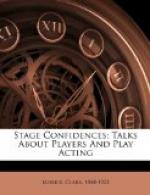They visited another minister, and their second experience differed from their first in two points,—the gentleman was quicker in his recognition and refusal, and refrained from banging the door. And so they drove up and down and across the city, till at last they stood at the carriage door and looked helpless at each other. Then the man said, “That’s the last one, Kate,” and the woman answered, “Yes, I know—I know.” She drew a long, hard breath that was not far from a sob, and added, “Yes, they’ve downed me; but it wasn’t a fair game, Jim, for they’ve played with marked cards.”
She had entered the carriage when the driver with the all-pervading knowledge and unlimited assurance of the Western hackman remarked genially: “Madame Elize, there’s another gospel-sharp out on the edge of the town. He’s poorer than Job’s turkey, and his whole dorgon’d little scantlin’ church ain’t bigger than one of them Saratogy trunks, but his people just swear by him. Shall I take you out there?”
Madame Elize nodded an assent, and once more they started. It was a long drive. The horses strained up killing grades, sending out on the cold air columns of steam from their dilating nostrils. The driver beat first one hand and then the other upon his knees, and talked amicably if profanely to his horses; but inside the carriage there was utter silence.
At last they stopped before a poor, cold-looking little cottage, and entering made their wishes known to a blue-eyed, tall young man, with thin, sensitive lips, who listened with grave attention. He knew precisely who and what she was, and very gently told her he would have to ask one unpleasant question, “Was the man at her side acquainted with her past, or was he a stranger who was being deceived—victimized, in fact?”
And Kate, with shining eyes, turned and said: “Tell him, Jim, how for six honest, innocent years we were friends. Then tell him how for fifteen years we’ve been partners in life. Tell him whether you know me, Jim, or whether you’re victimized.”
And then the young minister had told them he was proud and thankful to clasp their hands and start them on their new path, with God’s blessing on them. And they were married at last; and as they drove away, they noted the strange outlines of the mountains, where they reared their stupendous bulk against the star-sown sky. A sense of awe came upon them—of smallness, of helplessness. Instinctively they clasped hands, and presently the woman said: “Oh, Jim, the comfort of a wedding ring! It circles us about so closely, and keeps out all the rest of the world.”
And Jim stooped his head and kissed her.
CHAPTER XIX
SALVINI AS MAN AND ACTOR_
It is not often, I fancy, that one defends one’s hero or friend from himself. Yet that about describes what I am doing now for the famous Salvini. An acquaintance of mine, a man self-contained and dignified, who was reading the other day, startled me by muttering aloud, “Oh, that mine enemy would write a book!” and a moment later, flinging the volume from him, he cried: “Where were his friends? Why did they permit him to write of himself?”




